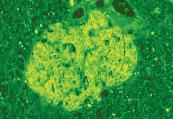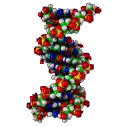About us
The major questions we are addressing in our research are:
Why and how does type 1 diabetes develop?
Type 1 diabetes develops in individuals with
- certain combinations of genes
- exposure to unidentified environmental factors
In these people, insulin producing cells are inappropriately identified as 'foreign' and targeted for destruction by the immune system – this is 'autoimmunity'
We have studied this in the BOX study.
Autoimmunity can be detected by looking for AWAF directed against the insulin producing cells in pancreas. It may be detected many years before any symptoms of type 1 diabetes are seen. Our studies have found that autoantibodies may be found up to 25 years before someone develops type 1 diabetes.
Other studies suggest that the process starts in infancy even in people who develop diabetes as adults.
Can we predict type 1 diabetes?
 Islet antibodies are very good markers of future type 1 diabetes and have been the focus of much of our research. We have investigated ways in which antibodies can identify people who have an increased risk of developing diabetes in the BOX family study and in a large group of schoolchildren.
Islet antibodies are very good markers of future type 1 diabetes and have been the focus of much of our research. We have investigated ways in which antibodies can identify people who have an increased risk of developing diabetes in the BOX family study and in a large group of schoolchildren.
We have found that family members with particular antibody test results have more than 1 in 2 chance of developing diabetes within 5 years, while those who have no antibodies have a risk of less than 1 in 100. We have also collaborated with researchers all over the world to look at this question which is now the main focus of the TrialNet Natural History study.
 Genotype/phenotype research studies are useful in helping to identify non-immune causes of diabetes in very young, such as neonatal diabetes, that don’t require insulin treatment. Also in identifying young children with an increased risk of developing type 1 diabetes as the condition usually occurs in people who carry particular 'susceptibility' genes.
Genotype/phenotype research studies are useful in helping to identify non-immune causes of diabetes in very young, such as neonatal diabetes, that don’t require insulin treatment. Also in identifying young children with an increased risk of developing type 1 diabetes as the condition usually occurs in people who carry particular 'susceptibility' genes.
We have studied this in the BOX family cohort and have shown that children with first degree relatives with type 1 that have the highest risk combination of genes have a 1 in 20 chance of developing diabetes by the age of 15, compared with 1 in 300 in the population as a whole.
Can we prevent type 1 diabetes?
The answer is not yet, but...
Two large scale diabetes prevention trials have been carried out in recent years:
- ENDIT was coordinated by our research group and tested nicotinamide as a potential agent to delay or prevent the onset of type 1 diabetes. It was one of the first international clinical trials designed to test whether it was possible to prevent or delay the onset of type 1 diabetes in family members with islet cell autoantibodies. It involved research groups from 21 countries in Europe and North America who screened more that 30,000 relatives.
- Diabetes Prevention Trial- type 1 (DPT-1) was a large North American prevention trial using oral insulin.
Unfortunately neither nicotinamide nor insulin altered the risk of diabetes. Although in the DPT-1 study participants taking insulin orally appeared to have diagnosis of diabetes delayed slightly. These trials did show that large scale international collaborative prevention trials are possible and that our methods for predicting type 1 diabetes are accurate. They also prepared the way for a worldwide network to allow intervention trials to be completed as rapidly and efficiently as possible. We are now active members of TrialNet, a collaboration of clinicians and scientists from research centres across the world.